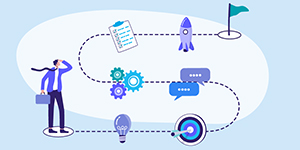The Future of Job Matching Algorithms & AI Recruitment Tools
The digital age has ushered in a revolution across many industries, and recruitment technology is no exception. As businesses strive to build teams faster and smarter, job matching algorithms have emerged as a pivotal force in transforming how employers connect with potential talent.
Using data and artificial intelligence, this creative approach finds perfect candidate-employer matches going beyond simple keyword matching. Recruitment algorithms are being included into the hiring process to make it more effectives, accurate and surprisingly straightforward.
 |
How Recruitment Algorithms Are Streamlining Talent AcquisitionWith so many candidates in the contemporary job market, it is more difficult for recruiters to manually comb through CVs. By automating the processing of applications, evaluating qualifications, and filtering individuals according to pre-defined criteria, recruitment algorithms simplify this procedure. This is where job matching algorithms play a crucial role. |
These intelligent systems use candidate matching algorithms to evaluate not only what candidates say on paper, but also how well their skills, experiences, and values align with a company’s expectations. The use of automated recruitment systems enables recruiters to focus more on strategy and candidate engagement rather than tedious sorting task. In this way, the integration of AI recruitment tools improve both speed and quality of hiring decision.
Advancements in Hiring Algorithms for More Accurate Matches
Constantly changing, hiring algorithms use machine learning and natural language processing to boost accuracy. Often, conventional hiring depends on superficial measures like years of experience or educational background. However, job matching algorithms dig deeper, analyzing candidate profiles for soft skills, personality traits, and cultural compatibility.
One of the benefits of job matching algorithms for hiring managers is the reduction in bias. Unlike human recruiters, algorithms evaluate every candidate uniformly. This equalizes the playing field and makes hiring not only quicker but also more just. Embedded with artificial intelligence, recruitment technology can draw attention to high-potential applicants who might otherwise be missed during a manual assessment.
Read more: AI Recruitment Tools & Software for Cambodian Businesses
The Impact of AI Recruitment Tools on Modern Hiring
With AI recruitment tools, companies are beginning to understand how job matching algorithms are changing recruitment. These tools enable data-driven decision-making by predicting which candidates are most likely to succeed in a given role. The predictive nature of job matching technology enhances strategic planning for HR departments.
The distinguishing feature of artificial intelligence recruiting tools is their capacity to learn and develop. This algorithm evolve to fit recruiting patterns, internal comments and industry trend, hence becoming more accurate with every hiring cycle. From behavioral evaluation to resume screening, artificial intelligence-driven recruitment algorithms are adding new degrees of intelligence to the hiring process.
Enhancing Candidate Experience with Job Matching Technology
While companies benefit from faster and more accurate hiring, candidate also gain from job matching technology. Many platforms now offer applicants feedback, personalized job recommendations, and transparency throughout the hiring process. Job matching algorithms examine past applications, user preferences and performance to recommend position that fit a candidate's professional aspirations.
Driven by recruitment technology, this user-centered strategy fosters better involvement and lowers application stage drop-off. Candidates believe their time and ability are being valued so it also fosters confidence. Automated recruiting systems are anticipated to increasingly tailor the hiring process as they develop, hence improving satisfaction for all side of the hiring equation.
Job Matching Algorithms and the Future of Recruitment Technology
The function of job matching algorithm in hiring is projected to increase substantially going forward. Recruitment technology will have to change fast as the workplace get more global and remote hiring becomes norm. Algorithms will not only fill positions but also forecast labor trend, highlight skill shortages, and suggest internal mobility routes.
For hiring managers, the benefits of job matching algorithms for hiring managers include better retention rates, increased diversity, and strategic workforce planning. In the near future, we may even see fully automated recruitment systems capable of managing the entire hiring lifecycle—from job posting to onboarding—with minimal human intervention.
However, despite their strengths, these tools are not without challenges. Ethical concerns, such as data privacy and algorithmic bias, remain ongoing conversations in the HR tech space. Ensuring transparency and accountability will be essential to maintaining trust in AI recruitment tool.
Why Recruitment Algorithms Are Essential for Hiring Managers
Here are some reason of why recruitment algorithms are essential for hiring managers.
- The pressure to deliver high-quality hires quickly has never been more intense. With increased competition for top talent, recruiters must act fast without sacrificing quality.\
- Recruitment algorithm streamline the hiring process by automating repetitive tasks such as resume screening and candidate shortlisting, while also offering valuable insights based on data.
- Candidate matching algorithms shift the focus of recruitment from guesswork to strategic alignment, ensuring that candidates closely match both the skills required and the cultural fit of the organization.
- One of the key benefits of job matching algorithms for hiring managers is a significant reduction in time-to-hire. Despite the speed, the quality of hires remains high due to intelligent filtering and ranking.
- The data collected through job matching technology allows hiring teams to refine job descriptions, adjust role expectations, and gain a deeper understanding of the talent market, giving organizations a critical advantage.
- By integrating hiring algorithms with human intuition, businesses can achieve the ideal balance—leveraging automation for efficiency while still applying human judgment where personal connection and context are essential.
Conclusion
In summary, job matching algorithms are not just a trend; they are reshaping the very fabric of how organizations attract and retain talent. When powered by AI recruitment tool, the potential for efficiency, fairness, and accuracy multiplies. With a stronger foundation in recruitment technologies, companies can build smarter teams, faster—and candidates can find roles where they truly belong.
Intelligent, data-driven systems hold the future of recruiting. Recruitment algorithms and job matching technologies will always be great tools in the hiring toolbox as long as we keep innovating sensibly. Adopting these developments now will equip businesses and applicant for a more intelligent, inclusive and effective recruiting future.
Read More: Campus Recruitment Explained: Process, Training and Off-Campus Opportunities
Frequently Asked Questions
1. What are job matching algorithm?
Job matching algorithm is AI-driven systems that evaluate candidate data to connect them with suitable job opportunities based on skills, experience, and compatibility.
2. How do AI recruitment tool improve hiring efficiency?
AI recruitment tool automate resume screening, predict candidate success, and reduce manual workload, speeding up the hiring process while improving accuracy.
3. Can hiring algorithms help reduce bias?
Yes, hiring algorithms assess all candidates consistently, helping reduce unconscious bias and improving diversity in recruitment.
4. What is the role of recruitment technology in modern HR?
Recruitment technology streamlines the hiring process through automation, data analysis, and improved candidate experiences, leading to better hiring outcomes.
5. Are job matching technologies reliable?
When properly designed and monitored, job matching technology is highly reliable and continuously improves by learning from new data inputs and hiring outcomes.
6. How do candidate matching algorithms work?
Candidate matching algorithms analyze data from resumes, job descriptions, and past performance to suggest the best-fit candidates for specific roles.





